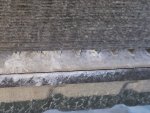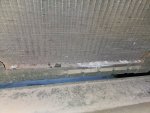Looks corroded but not totally eaten up from the pics (swing my any radiator shop for confirmation). If so, a repair or replace is likely the only option. Even a shop with a good torch man can only do so much, but it's worth a look. If it is just the welds and the passages (flat tubes) are in solid shape, they might be able to do a rod-out and re-solder the header.
Clean it up carefully good with a soft wire brush (I'd not advise power spraying unless it was VERY low psi) and assess the condition of the actual metal (the solder can be redone, again if the torch man is really good and the corrosion hasn't eaten thru the actual passages). You can put a thermometer gun to it (look for hot spots) and get some idea if the passages are in fact blocked by corrosion inside. Reparability really boils down to the state of the metal, not the solder/welds. If the passages are really bad, rodding them out will just remove the corrosion that's stopping the leaks and create more (the passages are thin metal to begin with). They can sometimes crimp off and seal bad passages (if the header isn't completely fugged). But crimping off too many passages will start to effect the cooling potential of the radiator. Also check the condition of the cooling fins. If they are starting to deteriorate, effective repair becomes sketch.
A shop can also tell you if a recore is available (and for CAT stuff they should be) but the industrial cores are pricey. Still worth the ask. You can measure the L/W/H of the core (not the tanks) and count the passages/tubes ( how many rows deep). Also measure the base of the tank (the top and bottom are the same). That's the header size. With that info, you know what core to get (again, get a shop to confirm). Doing a recore they reuse the OEM tanks (which are pretty much bulletproof. They clean up the tanks with acid, solder the tanks back onto the new core, pressure test it to spec, paint it, and hand it back to you. It can often be about half the cost of new on industrial stuff.
There are lots of good takeoffs out there. Might start fishing around and get an idea of cost+shipping (they're heavy).
In any event, prep for pulling it. I wouldn't let a rad shop pull it for me (DIY or find someone who works on industrial equipment). It's gotta come out no matter what.
Third <--owned a radiator shop for a couple years in a past life
btw: that's what antifreeze typically does to metal surfaces when it's openly exposed to oxygen




